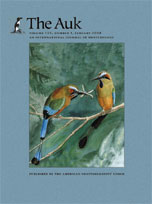Lynn Bloxom (Marty) Martin II has significantly contributed to progress in the field of eco-immunology, which is currently proving its explanatory power in many aspects of biology. Martin studies the physiological mechanisms that underlie life histories in free-living vertebrates, particularly birds. He combines field work with laboratory experiments, but his emphasis is always on understanding organismal responses in natural settings. Specifically, Martin is interested in understanding the connection between the immune system, energy expenditure, and survival of birds (and mammals). Such an approach is novel and has high potential in both basic and applied sciences.
Martin's career has already been highly productive. He began his master's thesis as a naturalist at the Virginia Commonwealth University (VCU), studying woodpecker abundance and distribution in a managed hardwood forest. His emphasis was on what sorts of dead trees were preferred for foraging and excavating by eastern North American woodpeckers. Subsequently, he joined Martin Wikelski's lab in the Department of Ecology and Evolutionary Biology at Princeton University, where he received his Ph.D. for a study of immune adaptations of temperate and tropical House Sparrows (Passer domesticus). He then joined Randy Nelson's lab in the Department of Psychology at The Ohio State University (OSU), where he continued to study immune-life history connections in rodents. In fall 2007, Martin started his own research group as an assistant professor in the Division of Integrative Biology, Department of Biology, at the University of South Florida in Tampa. His current research involves identification of the physiological traits of good invasive species and the influence of Stressors on immunity in wild animals.
Martin's publications are cornerstones for the new scientific field of eco-immunology. He and a small cohort of young colleagues across the globe have started to conduct research on comparative immunology in ecological contexts, research that essentially did not exist 20 years ago because many considered it unachievable. Martin's seminal contributions, thus far, are findings that (1) immune responses can be as expensive energetically as breeding, (2) immune defenses differ in predictable ways between ecologically distinct populations, (3) immune differences vary over time depending on environmental conditions, and (4) immunocompetence is not a monolithic trait that can be accurately characterized by one assay. Despite the complexity of the immune system, Martin's research suggests that general patterns of immune responses emerge when individuals, species, and populations are compared in natural settings, and that immune responses are tuned to individual life histories.
Martin is also a superb and dedicated teacher. His ideal is to combine mentorship with research so that students can actively participate in exciting new discoveries. He has received several teaching awards and mentored numerous undergraduate theses at VCU, Princeton, and OSU. Several scientific papers were published from these studies that included undergraduate students. Martin is both challenging and supportive to students, a style highly praised by the students he has taught. The AOU is proud to award Lynn Bloxom Martin II the Ned K. Johnson Young Investigator Award for 2007.
Award criteria.—The Ned K. Johnson Young Investigator Award recognizes outstanding and promising work by a researcher early in his or her career in any field of ornithology. Candidates excel in research and show distinct promise for leadership in ornithology within and beyond North America. They must have received their doctorate within five years of being nominated, must not have received the award previously, and must be a member of the AOU at the time of nomination. The award consists of a framed certificate and an honorarium provided through a gift to the endowment of the American Ornithologists' Union honoring Ned K. Johnson, a lifelong supporter and former President (1996–1998) of the AOU. This award, presented for the first time in 2005, is funded by the Ned K. Johnson Fund of the AOU.






